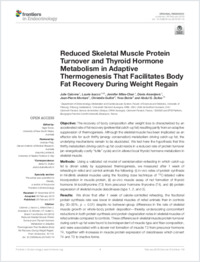Reduced skeletal muscle protein turnover and thyroid hormone metabolism in adaptive thermogenesis that facilitates body fat recovery during weight regain
- Calonne, Julie Department of Endocrinology, Metabolism and Cardiovascular System, Faculty of Sciences and Medicine, University of Fribourg, Switzerland
- Isacco, Laurie Department of Endocrinology, Metabolism and Cardiovascular System, Faculty of Sciences and Medicine, University of Fribourg, Switzerland - Université Clermont Auvergne, INRA, UNH, Unité de Nutrition Humaine, CHU Clermont-Ferrand, Service de Nutrition Clinique, CRNH Auvergne, Clermont-Ferrand, France - EA3920 and EPSI Platform, Bourgogne Franche-Comté Université, Besançon, France
- Miles-Chan, Jennifer L. Department of Endocrinology, Metabolism and Cardiovascular System, Faculty of Sciences and Medicine, University of Fribourg, Switzerland
- Arsenijevic, Denis Department of Endocrinology, Metabolism and Cardiovascular System, Faculty of Sciences and Medicine, University of Fribourg, Switzerland
- Montani, Jean-Pierre Department of Endocrinology, Metabolism and Cardiovascular System, Faculty of Sciences and Medicine, University of Fribourg, Switzerland
- Guillet, Christelle Université Clermont Auvergne, INRA, UNH, Unité de Nutrition Humaine, CHU Clermont-Ferrand, Service de Nutrition Clinique, CRNH Auvergne, Clermont-Ferrand, France
- Boirie, Yves Université Clermont Auvergne, INRA, UNH, Unité de Nutrition Humaine, CHU Clermont-Ferrand, Service de Nutrition Clinique, CRNH Auvergne, Clermont-Ferrand, France
- Dulloo, Abdul G. Department of Endocrinology, Metabolism and Cardiovascular System, Faculty of Sciences and Medicine, University of Fribourg, Switzerland
- 28.02.2019
Published in:
- Frontiers in Endocrinology. - 2019, vol. 10, p. 119
English
Objective: The recovery of body composition after weight loss is characterized by an accelerated rate of fat recovery (preferential catch-up fat) resulting partly from an adaptive suppression of thermogenesis. Although the skeletal muscle has been implicated as an effector site for such thrifty (energy conservation) metabolism driving catch-up fat, the underlying mechanisms remain to be elucidated. We test here the hypothesis that this thrifty metabolism driving catch-up fat could reside in a reduced rate of protein turnover (an energetically costly “futile” cycle) and in altered local thyroid hormone metabolism in skeletal muscle.Methods: Using a validated rat model of semistarvation-refeeding in which catch-up fat is driven solely by suppressed thermogenesis, we measured after 1 week of refeeding in refed and control animals the following: (i) in-vivo rates of protein synthesis in hindlimb skeletal muscles using the flooding dose technique of 13C-labeled valine incorporation in muscle protein, (ii) ex-vivo muscle assay of net formation of thyroid hormone tri-iodothyronine (T3) from precursor hormone thyroxine (T4), and (iii) protein expression of skeletal muscle deiodinases (type 1, 2, and 3).Results: We show that after 1 week of calorie-controlled refeeding, the fractional protein synthesis rate was lower in skeletal muscles of refed animals than in controls (by 30–35%, p < 0.01) despite no between-group differences in the rate of skeletal muscle growth or whole-body protein deposition—thereby underscoring concomitant reductions in both protein synthesis and protein degradation rates in skeletal muscles of refed animals compared to controls. These differences in skeletal muscle protein turnover during catch-up fat were found to be independent of muscle type and fiber composition, and were associated with a slower net formation of muscle T3 from precursor hormone T4, together with increases in muscle protein expression of deiodinases which convert T4 and T3 to inactive forms.Conclusions: These results suggest that diminished skeletal muscle protein turnover, together with altered local muscle metabolism of thyroid hormones leading to diminished intracellular T3 availability, are features of the thrifty metabolism that drives the rapid restoration of the fat reserves during weight regain after caloric restriction.
- Faculty
- Faculté des sciences et de médecine
- Department
- Département de Médecine
- Language
-
- English
- Classification
- Biological sciences
- License
- License undefined
- Identifiers
-
- RERO DOC 324337
- DOI 10.3389/fendo.2019.00119
- Persistent URL
- https://folia.unifr.ch/unifr/documents/307668
Statistics
Document views: 103
File downloads:
- dul_rsm.pdf: 175
